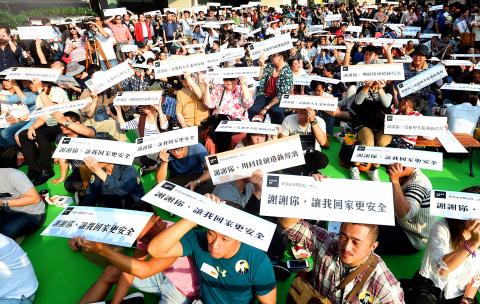US ride-hailing company Uber Technologies Inc yesterday said it does not plan to exit the Taiwanese market yet, despite looming fines.
Uber’s comments came as the San Francisco-based company is facing up to NT$25 million (US$775,194) in fines after the legislature passed an amendment to the Highway Act (公路法) earlier this month, significantly increasing fines on illegal taxi service operators by about 166 times.
Uber’s local unit could be forced to shut down after President Tsai Ing-wen (蔡英文) signs the amendment into law.

Photo: Lin Cheng-kung, Taipei Times
“The company considers Taiwan an important market,” Uber Taiwan general manager Gu Li-kai (顧立楷) said. “We hope to stay and to grow our business here. We hold a relatively optimistic view about this.”
Gu made the remarks on the sidelines of a news conference for the launch of a campaign in Taipei, “StandByU-Uber stays,” calling on consumers and drivers to support the ride-sharing service.
“We will continue to communicate with government agencies to look for any possibility of relaxing the rules… We hope to reach a consensus with the government as soon as possible,” Gu said.
The campaign is the latest effort by Uber to curry favor with the public as the company’s talks with the government have stalled.
“Uber is concerned about the heavy penalties and about their impact on freelance drivers,” Gu said.
It is unsuitable to apply existing public transportation rules, which have been in place for three or four decades, to regulate the six-year-old car-sharing industry, Gu said.
Uber offers an app-based ride-sharing service, which is very different from companies in the traditional transportation industry, he said.
The company is exploring better solutions in Taiwan and in other countries to adjust outdated rules and to make it possible for the ride-sharing industry, or the whole sharing-economy to develop, he said.
India unveiled a more liberal taxi policy to allow Uber and its Indian rival, Ola, to offer app-based ride-sharing services in the country, Gu said.
The Uber Taiwan app has been downloaded about 1 million times and the firm has recruited about 10,000 drivers since it entered the market in 2013.
Gu said the company is willing to pay e-commerce operator taxes, that mean Google Play, Uber and Apple Store pay 5 percent business tax.
Uber in talks with more than 10 insurers, including Fubon Insurance Co (富邦產險), to offer insurance solutions for its drivers, Gu said.
However, insurers are conservative about collaborating with Uber due to the government’s ambiguous stance over its ride-sharing service, Gu said.

Sweeping policy changes under US Secretary of Health and Human Services Robert F. Kennedy Jr are having a chilling effect on vaccine makers as anti-vaccine rhetoric has turned into concrete changes in inoculation schedules and recommendations, investors and executives said. The administration of US President Donald Trump has in the past year upended vaccine recommendations, with the country last month ending its longstanding guidance that all children receive inoculations against flu, hepatitis A and other diseases. The unprecedented changes have led to diminished vaccine usage, hurt the investment case for some biotechs, and created a drag that would likely dent revenues and

Global semiconductor stocks advanced yesterday, as comments by Nvidia Corp chief executive officer Jensen Huang (黃仁勳) at Davos, Switzerland, helped reinforce investor enthusiasm for artificial intelligence (AI). Samsung Electronics Co gained as much as 5 percent to an all-time high, helping drive South Korea’s benchmark KOSPI above 5,000 for the first time. That came after the Philadelphia Semiconductor Index rose more than 3 percent to a fresh record on Wednesday, with a boost from Nvidia. The gains came amid broad risk-on trade after US President Donald Trump withdrew his threat of tariffs on some European nations over backing for Greenland. Huang further

CULPRITS: Factors that affected the slip included falling global crude oil prices, wait-and-see consumer attitudes due to US tariffs and a different Lunar New Year holiday schedule Taiwan’s retail sales ended a nine-year growth streak last year, slipping 0.2 percent from a year earlier as uncertainty over US tariff policies affected demand for durable goods, data released on Friday by the Ministry of Economic Affairs showed. Last year’s retail sales totaled NT$4.84 trillion (US$153.27 billion), down about NT$9.5 billion, or 0.2 percent, from 2024. Despite the decline, the figure was still the second-highest annual sales total on record. Ministry statistics department deputy head Chen Yu-fang (陳玉芳) said sales of cars, motorcycles and related products, which accounted for 17.4 percent of total retail rales last year, fell NT$68.1 billion, or

MediaTek Inc (聯發科) shares yesterday notched their best two-day rally on record, as investors flock to the Taiwanese chip designer on excitement over its tie-up with Google. The Taipei-listed stock jumped 8.59 percent, capping a two-session surge of 19 percent and closing at a fresh all-time high of NT$1,770. That extended a two-month rally on growing awareness of MediaTek’s work on Google’s tensor processing units (TPUs), which are chips used in artificial intelligence (AI) applications. It also highlights how fund managers faced with single-stock limits on their holding of market titan Taiwan Semiconductor Manufacturing Co (TSMC, 台積電) are diversifying into other AI-related firms.